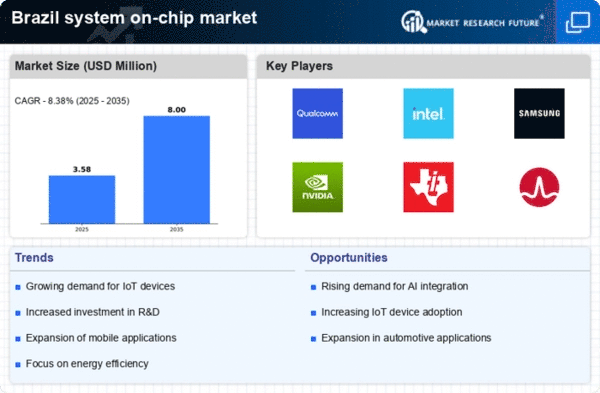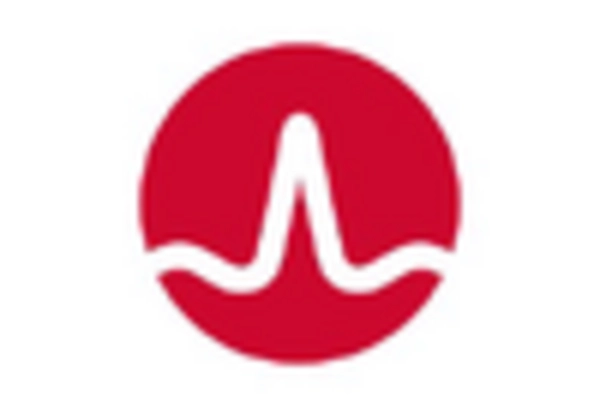Emergence of 5G Technology
The rollout of 5G technology in Brazil is poised to revolutionize various industries, creating new opportunities for the system on-chip market. With the promise of faster data speeds and lower latency, 5G is expected to enhance the performance of connected devices, driving demand for advanced system on-chip solutions. In 2025, the 5G infrastructure market in Brazil is projected to reach $8 billion, with a substantial portion dedicated to system on-chip technologies that support 5G applications. These chips are essential for enabling high-speed communication and processing capabilities in devices such as smartphones, IoT devices, and smart city infrastructure. As the adoption of 5G technology accelerates, the system on-chip market is likely to benefit from increased demand for innovative solutions that can leverage the capabilities of this next-generation network.
Growing Consumer Electronics Sector
The consumer electronics sector in Brazil is experiencing robust growth, which is likely to drive the system on-chip market. With an increasing number of households acquiring smart devices, the demand for integrated circuits is expected to rise. In 2025, the consumer electronics market in Brazil is projected to reach approximately $30 billion, indicating a growth rate of around 8% annually. This surge in demand for smart TVs, smartphones, and wearables necessitates advanced system on-chip solutions that offer enhanced performance and energy efficiency. As manufacturers strive to meet consumer expectations for high-quality, multifunctional devices, the system on-chip market is poised to benefit significantly from this trend. The integration of various functionalities into a single chip not only reduces costs but also improves the overall user experience, further propelling market growth.
Increased Focus on Energy Efficiency
Energy efficiency is becoming a critical consideration in various sectors in Brazil, influencing the system on-chip market. As businesses and consumers alike seek to reduce energy consumption and lower costs, the demand for energy-efficient system on-chip solutions is expected to rise. In 2025, the energy-efficient electronics market in Brazil is projected to reach $5 billion, with system on-chip technologies playing a pivotal role in this transition. These chips are designed to optimize power usage while maintaining high performance, making them ideal for applications in smart homes, industrial automation, and consumer electronics. The emphasis on sustainability and reducing carbon footprints is likely to drive innovation in system on-chip designs, further enhancing their appeal in the market. Consequently, the focus on energy efficiency is anticipated to significantly impact the growth trajectory of the system on-chip market.
Advancements in Automotive Technology
The automotive industry in Brazil is undergoing a transformation, with a notable shift towards electric and autonomous vehicles. This evolution is expected to create substantial opportunities for the system on-chip market. As vehicles become more connected and reliant on advanced electronics, the demand for sophisticated system on-chip solutions is likely to increase. In 2025, the Brazilian automotive electronics market is anticipated to reach $10 billion, with a significant portion allocated to system on-chip technologies. These chips are essential for managing various vehicle functions, including infotainment systems, navigation, and safety features. The integration of system on-chip solutions can enhance vehicle performance and safety, making them indispensable in modern automotive design. Consequently, the growth of the automotive sector is expected to have a direct positive impact on the system on-chip market.
Rise of Internet of Things (IoT) Applications
The proliferation of Internet of Things (IoT) applications in Brazil is emerging as a key driver for the system on-chip market. As industries increasingly adopt IoT solutions for automation and data collection, the need for efficient and compact system on-chip designs is becoming more pronounced. In 2025, the IoT market in Brazil is projected to grow to $15 billion, with a significant portion of this growth attributed to the demand for system on-chip technologies. These chips facilitate seamless connectivity and data processing, enabling devices to communicate effectively. The ability to integrate multiple functionalities into a single chip not only reduces space and power consumption but also enhances the overall performance of IoT devices. As more sectors, including agriculture, healthcare, and manufacturing, embrace IoT, the system on-chip market is likely to experience substantial growth.















